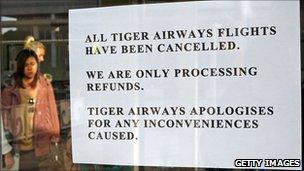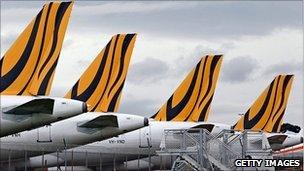Emergency landing: Can Tiger Airways roar back?
- Published

The cancellation of flights has resulted in huge financial loss for Tiger Airways
The grounding of Tiger Airways by Australian regulators is threatening to push up fares for domestic travellers.
Its entire fleet was pulled from service last week because of safety concerns, the first time such sweeping measures have been taken in Australia.
The company seems confident it will soon be flying again. Even after its grounding, it had been selling tickets for travel next week and beyond - before coming under pressure from the Australian Competition and Consumer Commission.
However, the carrier's plans to start flying soon were dealt a big blow as Australia's Civil Aviation Safety Authority said on Thursday that it is seeking an extension of the grounding till 1 August.
Should the budget carrier - which drove prices down after it entered the Australian market in 2007 - be beyond salvage, then its domestic rivals, Qantas and Virgin Australia, would be expected to raise fares by up to 15%.
Tough to comeback?
Christopher Zinn, the director of campaigns at Choice, an independent consumer watchdog, believes the airline - which advertised one-way tickets between Sydney and Melbourne for 39 Australian dollars ($41; £26) - will struggle to recover.
"It is a rather sad disgrace at present and how they come back from this will be very interesting to see," Mr Zinn told the BBC.
"Tiger for all its shortcomings has really pushed down prices, so they have given much-needed competition to the skies and was enough to make the other airlines work a bit harder.
"We could certainly see that bottom end evaporate somewhat because they really did draw a line in the sand in terms of low fares and that worked very much for some people."
Tiger Airways, partly owned by Singapore Airlines, has issued a statement saying it is cooperating with Australia's Civil Aviation Safety Authority (CASA).
Peter Marosszeky, from the School of Aviation at the University of New South Wales, says with such powerful backers, the low-cost carrier should bounce back.
"Their oversight has not been as thorough as it should've been, [but] I don't have any doubt in my mind that they can fly again," he said.
"As long as Tiger can bring their systems up to the standards the regulator wants, they should be okay.
Lost reputation

Tiger Airways will have to work towards regaining customer trust after the grounding of its planes
"If the regulator permits Tiger to operate and allows them to go back into the air, it will be done in accordance with some pretty strict guidelines and passengers should really feel comfortable.
"Having said that, there will be some commercial damage - but memories are fairly short in this business and the airline could recover quite successfully," he added.
With its aircraft stuck on the tarmac, Tiger is losing about one and a half million Australian dollars a week, which is bad news for a company that was already losing money.
Regulators stepped in after Tiger flights flew too low on an approach to Avalon airport near Melbourne last week and again heading into the city's Tullamarine airport in June.
A review of the airline's training and monitoring of its pilots is a key part of the safety investigation.
Australian and International Pilots Association vice president Capt Richard Woodward says Tiger has had insufficient time to convince the authorities it is fit to fly.
"We can't do much in five days," he said. "All you could do is put together a plan to show that you're actually addressing the issues that the civil authority has identified.
"The decision here will be whether the plan itself is enough to satisfy the CASA or whether they want to see actions.
"If it's not resolved in a few weeks they might not recover," said Capt Woodward.
As Tiger tries to fend off extinction, its rivals are ready to pounce, and this week shares in both Qantas and Virgin Australia have risen sharply.
- Published4 July 2011